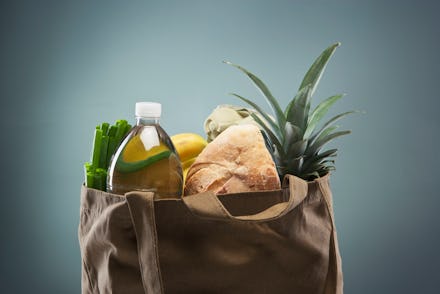How to grocery shop safely during coronavirus without being a jerk

Pre-pandemic, grocery shopping was pretty chill. Maybe you’d stress over the long lines, or the store running out of your go-to oat milk. But what used to be the most mundane of weekend activities is now fraught and chaotic. Customers are disinfecting their shopping carts. Others have bought up masks, despite there being no evidence of them offering protection from COVID-19, leaving little for the health workers who actually need them. And viral videos have circulated of people throwing down over toilet paper. You don’t want to be That Person at the grocery store — but at the same time, it’s understandable that we’re all on edge right now. Here’s a cautious but rational person's guide to grocery shopping in the time of corona.
Wipe down your shopping cart before and after use
Shopping carts are teeming with bacteria. Researchers detected digestive tract bacteria on 73% of 85 shopping carts in five metropolitan areas in a 2012 study cited by the New York Times. The newspaper recommends wiping down the child seat and handle not only before shopping, to protect yourself, but afterward, as a courtesy for whoever uses your cart next. Bring your own wipes, or use the ones provided at many stores.
And if wipes aren’t available, it’s not the end of the world. Daniel Winetsky, infectious diseases fellow at Columbia University Irving Medical Center, told the Times that the risk of infection from touching a cart is likely negligible. Simply avoid touching your face and wash your hands after shopping.
Stay six feet away from others. If you can’t do six, three is fine.
The Centers for Disease Control and Prevention recommends staying at least six feet away from others. But since this isn’t always possible at the grocery store, shoot for the World Health Organization’s suggested distance of at least three feet, the Times says. Even a little space can provide a buffer, since most of the potentially novel coronavirus-laden droplets emitted while breathing can land within a few feet of you, Witnetsky told the outlet.
You have a higher risk of getting infected by another person than by touching surfaces, Lauren Sauer, an assistant professor of emergency medicine at Johns Hopkins University School of Medicine, told TIME, so take social distancing seriously.
Minimize touching — and definitely don’t touch your face
Assume that the novel coronavirus is on food and other surfaces in the store, so touch them only as needed, Christopher Gill, an associate professor of global health at the Boston University School of Public Health, told TIME. The same goes for your personal items. To avoid coating your phone in viral particles, use an old-school paper shopping list that you can recycle later, Sauer told TIME. Use a mobile app like Apple Pay if you can; while you want to keep touching your phone to a minimum, the benefits of avoiding contact with the cashier outweighs the risk of scrolling through your phone in this case.
Lastly, do not touch your face. Seriously. Think of all the people who touched the items in your cart before you did. Now think of those germs, which may include coronavirus, that could end up in your eyes, nose, or mouth if you touch your face.
Don’t hoard
The Washington Post suggests taking fewer shopping trips but buying more at once to minimize your risk of exposure — two to three weeks’ worth, if you can swing it. That does not mean clearing out the canned food or toilet paper aisle. Don’t be a jerk; save enough for other shoppers. Despite temporary shortages of certain products and stores running out of stock, the New York Times reports that food makers believe the supply chain will hold up.
Be conscientious of checkout staff
Place money on the counter rather than in the cashier’s hand and take other steps to maintain social distance from them, but remember to treat them like a human, per the New York Times. Be pleasant and maybe even thank them for putting themselves at risk, Robert Amler, dean of New York Medical College School of Health Sciences and Practice, told the newspaper. Elizabeth Eckstrom, professor and chief of geriatrics at Oregon Health & Science University, also told the Times that if you bring a reusable bag, offer to pack it yourself to avoid exposing checkout staff to your germs.
Wash your hands afterward
Rub on hand sanitizer as soon as you step out of the store, especially before you touch your car’s steering wheel, Eckstrom told the New York Times. A CDC spokesperson told TIME that you should also wash your hands right when you get home— with soap and water for at least 20 seconds — especially prior to eating or handling food. After putting everything away, the CDC suggests washing your hands again and cleaning light switches, handles, counters, and other surfaces in your kitchen, according to TIME.
You probably don’t need to wipe down your items when you get home, but you can just to be safe
The CDC doesn’t suggest wiping down your items, per TIME, since there’s no evidence of novel coronavirus spread related to food or food packaging. But if you want to be uber-cautious, Jonathan Fielding, a professor of health policy and management at the University of California Los Angeles’s School of Public Health, told the magazine that a vegetable brush would suffice; just make sure to clean it between brushing each produce item. CNN recommends using soap and water, or disinfectant wipes to clean cans and other containers when you get home.